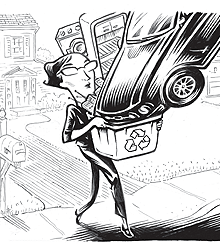Illustration by Lars Leetaru
Since Earth Day in 1970, schoolchildren have heard the mantra “reduce, reuse, recycle” as the solution for the growing problem of consumer waste. One could argue that the slogan has worked remarkably well. In the U.S., according to the Environmental Protection Agency, the average consumer generated 2.7 pounds of trash each day in 1960 — and 2.5 pounds of that went straight to the landfill. Over the next 20 years, per capita waste generation grew 37 percent, to 3.7 pounds per person, but thanks to increased recycling and energy recovery techniques, discards to landfills increased only 29 percent, to 3.2 pounds, and, more importantly, hit a peak. From 1980 to 2000, U.S. landfill discards actually decreased by 19 percent, even though waste generation continued to grow, to 4.7 pounds per person per day. Over the last decade, the reduce and reuse parts of the slogan have shown signs of catching on, as per capita waste generation has declined to 4.5 pounds per day, and the volume going into U.S. landfills is now less on a per capita basis than it was 50 years ago. Europe has, if anything, made even more progress.
Some forms of recycling have become the dominant mode for consumers. For example, 88 percent of newspapers and 77 percent of corrugated boxes are now recycled. Even though 38 percent of paper bags are recycled, consumers are now attacking the source by shifting to reusable shopping bags.
But consumer durable products — including televisions, refrigerators and other appliances, cell phones, and automobiles — offer a more intractable problem that requires deeper thought for consumers and — especially — for the businesses producing them. Overall, a third of municipal waste is now recycled, but the percentage for durable goods stands at only 17 percent. Worse yet, durables often contain hazardous materials not found in consumables and packaging. Unlike consumables, durable products face an “end of life” problem that requires more options than simply reducing, reusing, and recycling. For this set of products, the new mantra for producers increasingly includes a fourth “R”: rethink. Rethinking the environmental challenges posed by durable-goods waste also provides interesting opportunities for businesses. The challenges presented by discarded and unused cell phones, which we have studied closely, are a particularly good example.
Flaws of the “Three Rs”
1. Reduce. Decreasing the generation of waste makes sense, and has proven highly effective for consumer goods. For example, new concentrated products such as laundry and dishwashing detergent offer benefits by reducing packaging and transportation requirements.
Some consumer durables offer a similar opportunity to reduce size. The Commodore PET, the first personal computer, weighed 44 pounds, whereas the new Apple iPad weighs a little over 1.5 pounds. Reducing the size and weight does not work for many categories of durable goods, however. Consider the original Ford Mustang, introduced in 1964. It was 182 inches long and weighed 2,930 pounds. The latest Ford Mustang GT is only six inches longer but weighs 500 pounds more, despite an increased use of plastic and aluminum. (From a positive environmental standpoint, the Mustang’s fuel efficiency has improved from 18 miles per gallon (mpg) on the highway to 24 mpg — and more than 30 mpg for less-souped-up versions.)
Moreover, reducing product dimensions may have unintended negative consequences. Consider the fate of the largest carpet recycling facility ever built. The state-of-the-art Polyamid 2000 recycling facility in Premnitz, Germany, which cost US$200 million to build in 1999, closed after only three years. It turned out that a “reduce” strategy by European carpet manufacturers had shortened carpet pile and reduced the nylon content to a level that made recycling uneconomical. Please continue this article via strategy-business.com
________________________________________________________________________
Hire Jim Woods to Speak to or Advise Your Organization
Innovation, Growth, & Hypercompetition Consultant/Speaker/Business Coach
Website: InnoThink Group Request a consultation: Office: +1 719.649.4118 or complete our form.Innothink Group is a strategic management, innovation and business coaching consultancy.
Our Guarantee. Where many consulting firms are reluctant to bear risks or tie their rewards to project outcomes, we decided to build a better model. We align our success with yours. We’re outcome obsessed, outcome paid, putting nearly two thirds of our fees at risk subject to hitting predetermined milestones. More than a guarantee we wanted from the outset to create true partnerships with shared responsibility. See a few of our clients.We provide broad ranging advice covering innovation, commoditization, competitive advantage, business policy and strategy, as well as global strategy and implementation.

No comments:
Post a Comment